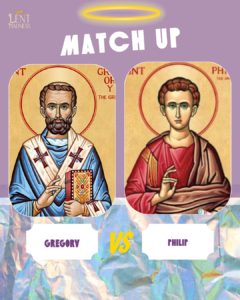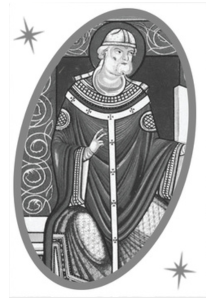 Today the Saintly Sixteen continues as Gregory the Great faces Philip, Deacon and Evangelist. Who will emerge the greatest of these two? That's for you to determine over the next 24 hours.
Today the Saintly Sixteen continues as Gregory the Great faces Philip, Deacon and Evangelist. Who will emerge the greatest of these two? That's for you to determine over the next 24 hours.
Yesterday, in a tight battle, Elizabeth of Hungry took down Mechthild of Magdeburg 53% to 43% to advance to the Elate Eight.
And in case you missed yesterday's stellar edition of Monday Madness, you can watch it here.
Vote now!
Gregory the Great
 It is all too common for those with great authority to fall short of the profound trust given to them. In fraught centuries following Christianity’s legalization as the religion of the Roman Empire, when power would could be exchanged just as transactionally as in any age, it is a testament to the character of Gregory the Great that he held with dignity the trust given to him as Bishop of Rome.
It is all too common for those with great authority to fall short of the profound trust given to them. In fraught centuries following Christianity’s legalization as the religion of the Roman Empire, when power would could be exchanged just as transactionally as in any age, it is a testament to the character of Gregory the Great that he held with dignity the trust given to him as Bishop of Rome.
Gregory’s Book of Pastoral Rule is among Gregory’s most lasting works. A guide for the clergy entrusted with spiritual care of the faithful, it remains one of the anchoring texts on pastoral ministry, even centuries later. “The care of feeding is a testimony of love,” Gregory writes, so clergy must “meditate diligently and every day on the precepts of the Word.” When doing so, they are cautioned against egotism and self-centeredness: “No one does more harm in the Church,” Gregory writes, “than he who has the title or rank of holiness and acts perversely” he writes. To do so is to damage their own soul: “Those who do not speak the words of God with humility must be advised that when they apply medicine to the sick, they must first inspect the poison of their own infection, or else by attempting to heal others, they kill themselves.”
Gregory is also remembered for sending Augustine of Canterbury to evangelize in England. One commonly held tale, recounted by the Venerable Bede, says that Gregory first encountered English boys at a slave market near Rome. “They are not Angles,” is reputed to have remarked “Non Angli, sed angeli” - “they are not Angles, but angels… and they ought to be co-heirs with the angels in heaven.” Indeed, it wasn’t simply the Angles for whom Gregory showed great care – a defining feature of his papacy was intervention on behalf of the poor and outcast: “I have frequently charged you,” he writes in one letter, “to act as my representative… to relieve the poor in their distress.”
As with all the saints, Gregory’s center was in Holy Scripture, which tells the story of Jesus and the love of God. In finding himself in that story, Gregory remarks that “Holy Scripture presents a kind of mirror to the eyes of the mind, so that our inner face may be seen in it. There we learn our own ugliness, and there our own beauty.” The beauty of a transformed life for himself and for others was the beating heart of Gregory’s ministry, and the reason we remember him well today.
Philip, Deacon and Evangelist
The book of Acts tells us that the gospel will be proclaimed “in Jerusalem, in all Judea and Samaria, and to the ends of the earth” (Acts 1:8). Philip, deacon and evangelist, leads this worldwide spread of the good news.
As the church is growing in Jerusalem, the evangelistic work of the Apostles comes under threat. They need people “of good standing, full of the Spirit and of wisdom” (Acts 6:3) to help distribute food to widows. Philip is nominated, along with six others, and the apostles commission him and the others to care for some of the most vulnerable in their community.
A couple chapters later, when Acts begins to describe the spread of the gospel outside of Judea, it is not the apostles who take the first brave step into Samaria, but it is Philip. He comes to Samaria with bold proclamation and signs–casting out demons and healing those who are paralyzed (see Acts 8:5-8). His message is received with “great joy” (Acts 8:8), even by the notorious magician, Simon Magus. Simon becomes one of Philip’s closest companions, continually filled with awe at the miracles that take place (Acts 8:13).
Once his work is fulfilled in Samaria, an angel directs him to go south to the road that leads from Jerusalem to Gaza. Philip, faithful evangelist that he is, obeys immediately and encounters an Ethiopian eunuch who is also a powerful official in the court of the queen of Ethiopia (modern day Sudan). This proclamation now begins to reach “the ends of the earth” (well before Peter’s famous encounter with Cornelius).
The eunuch is not only from the margins geographically. In spite of his powerful position, he is also marginalized from the religious community–according to Deuteronomy, eunuchs were not allowed full participation in the people of God (but see also Isaiah 56:3-5). You can imagine the eunuch’s interest in the passage from Isaiah about another marginalized man who had been treated unjustly (see Acts 8:32-33). Philip, in his wisdom, explains the good news about Jesus, and the eunuch asks to be baptized immediately. Philip obliges and as the eunuch rises out of the water, Philip is whisked away.
We last hear of Philip in Acts 21 when Paul has decided to return to Jerusalem. On his way he stays with Philip in Caesarea. Here we are introduced to Philip’s virgin daughters, who also have the gift of prophecy. These daughters are mentioned often in early Christian literature. Eusebius, the church historian, recounts how they spent time with Papias (an important bridge between the apostolic and post-apostolic church) and told him about the miraculous acts of God that they witnessed.
Philip was truly a deacon and evangelist – serving those on the margins and most in need and proclaiming the gospel near and far with wisdom and power.
70 comments on “Gregory the Great vs. Philip, Deacon and Evangelist”
Maybe one of the Sweet Sixteen can assure we get our LM emails at 8:00AM? We can only pray.
I must agree with St Celia and others today, that though Philip’s willingness to minister to all regardless of background is needed today, even more needed are bold words to the powerful on not abusing that power. So it’s Gregory today. And, an Angle myself, I’m glad he thought the Angles worthy of the Good News!
As a Angle immigrant, I am very much drawn to Gregory who lived the life of Christ by caring for the poorest in Rome and was a model for his fellow Romans.
For the second day in a row I’m unable to vote. The dots just keep spinning. And I can’t like other people’s comments. Please don’t let me be shut out of Lent Madness ☹️
“Holy Scripture presents a kind of mirror to the eyes of the mind, so that our inner face may be seen in it. There we learn our own ugliness, and there our own beauty.” For this quote and for all he did to bring people together, I cast my vote for Gregory the Great
What an exciting and interesting life Philip the Deacon had! And always remaining a steadfast servant to God.
I'm surprised that so many can't understand how Elizabeth won over Mechthild. Duh! How many in the LM community have daughters, mothers, aunts with the name Mechthild? Hmm? I loved learning about her but my daughter is an AlyssaBeth, her patron saint is an Elizabeth. I'm sure there were plenty of other voters just like me. Impressed by Mechthild but we are faithful to our St. Elizabeths!
I don't know. I guess I like Gregory because of his pastoral rule book put me over to his court. Another tough one though.
Very tough choice today
I am not trying to be picky but I feel like it is important to note that Ethiopia is not modern day Sudan. Ethiopia has continued to exist throughout history and to this day is called Ethiopia. Sudan is it's neighbor.